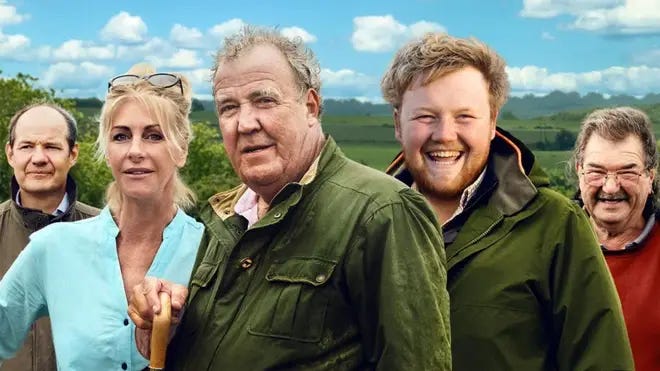On The Popularity Of Clarkson's Farm
Why such a humble show can scalp the biggest franchises
There’s a scene in the first series of Clarkson’s Farm, which I’ve just watched, in which Jeremy Clarkson’s sheep are shorn after displaying some rather off behaviour. Under the baking sun of 2020’s weirdly long heatwave, the animals have their inches-thick woolen blankets sheared, allowing their pinky-white bodies to be liberated from their suffocating coats and to feel the soft air once more on their skin. They leap, dance, and galavant across Chipping Norton’s lush greenery in a joyous celebration of liberation and life. As I watched it, a thought came to me: we’re all those sheep, and modern entertainment is the thick layer of smothering torment.
On paper, Clarkson’s Farm doesn’t have a lot going for it. A wealthy TV personality (widely disliked by Britain’s liberal intelligentsia) decides to hang out on the 1000-acre farm he bought in a well-heeled corner of bucolic English countryside, and we plebs are expecting to be invested? Yet, it is precisely the spectacular popularity of the show that reveals something about our current moment in the 2020s. Namely, the public yearns for authenticity, real people, natural settings, and reification of an England thought lost.
Amazon, which also carries the show, carries another show called Rings Of Power, which is rumoured to have set Amazon back an eye-watering billion dollars. Yet the show about a 60-year-old white man struggling to comprehend barley moisture regulations beats it in the ratings.
Clarkson’s warm, though curmudgeonly persona has a nigh-on infinite degree of resonance and connection. Clarkson, like Nigel Farage (unfortunately), is coded in the average British psyche as “friend” and not “enemy” in the Schmittian sense. He likes a pint in the pub, he swears, he makes politically incorrect quips and jibes, and we get the feeling that he “gets it”. Clarkson feels like an old friend, unlike the blank, interchangeable drones that the entertainment force feeds the viewing public incessantly. When Clarkson chooses his tractor, he opts for a ridiculously oversized Lamborghini with German text in the computer displays. It’s Jeremy Clarkson; we expect nothing else. This allows the quirky cast of regular characters to lambast Clarkson for choosing such an impractical and expensive vehicle, scolding him like a boy.
This brings us to the show's mechanics and wider cast. When trying to understand why a piece of media succeeds while so much (almost everything) fails these days, it is tempting to merely reduce it to being “natural” or not woke. However, Clarkson’s Farm has a structure and narrative with different characters in their supporting roles. If we break down and investigate the dynamics of Clarkson’s Farm more closely, the characters map nicely onto archetypes found throughout fiction and storytelling.
Jeremy Clarkson: The veteran television presenter has returned to the farm he bought many years ago, intending to run it and make it a viable business. He is wealthy but has no idea how to run a farm. Thus, he inhabits the “Lord of the Manor” and “Fish out of Water” archetypes. Given that most of the audience are not adept farmers, we identify with his perspective and learn as he learns.
Keep reading with a 7-day free trial
Subscribe to Morgoth’s Review to keep reading this post and get 7 days of free access to the full post archives.




